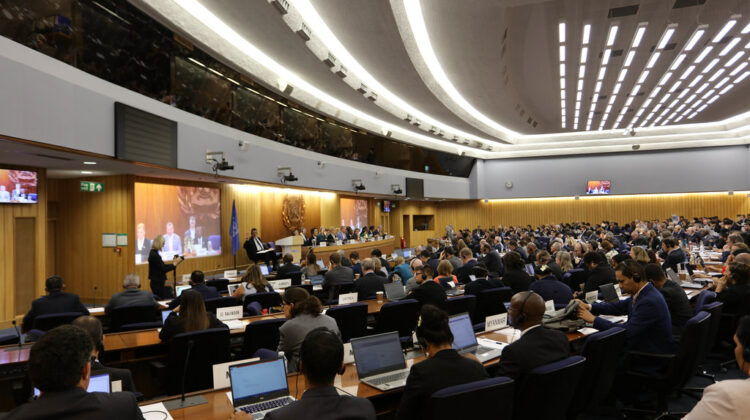
IMO progress and GHG levy momentum increases the imminence of the endgame for shipping’s use of fossil fuels
LONDON : The MEPC 81 meeting concluded on 22nd March 2024, further clarifying the risk and opportunity both for the international shipping value chain’s commercial decision making, and for this sector’s contribution to minimise the risks of dangerous climate change. The meeting itself was not a point of adoption for measures, but it was a chance to test whether the member states of the IMO were as committed to advance and implement policy measures capable of delivering the Revised GHG Strategy adopted in July 2023 (refer to the UMAS FAQs on the Revised GHG Strategy and its implications on national, regional and corporate action for detailed analysis of the Revised GHG Strategy).
The meeting concluded with progress made on several fronts but leaves the door open to a number of risks, including that of architecture, timing, scope of emissions, compliance and enforcement detailed in the UMAS readout.
Dr Tristan Smith, Director of UMAS and Associate Professor at UCL Energy Institute said: “Many reactions to the adoption of the IMO’s Revised GHG Strategy in 2023 can be summarised as ‘good to have this, but I’m waiting for the measures in 2025’, and many seem convinced that IMO was unlikely to succeed in implementing measures capable of delivering the strategy’s level of GHG reductions – and speed of change. This meeting’s development of a new MARPOL chapter, and good progress and momentum towards a timely and robust implementation of robust IMO policy, including an effective GHG levy, seriously questions the wisdom of commercial strategy of ‘wait and see’, or that is dependent on IMO not delivering what it committed to in 2023.”
A new draft for a chapter in the Annex VI of MARPOL has been initiated titled “regulations on the IMO net-zero framework”. Whilst, this new chapter is just a framework of subheadings for now, it includes all the elements needed to adopt any of the GHG policy options currently under consideration, as shown in ISWG GHG 16 readout). There was positive momentum built at the meeting, with an increased number and diversity of countries supporting a GHG levy, which supports both the energy and equitable transition agendas. The meeting has clarified both an expert workshop (on the modelling and analysis base of the measures), and the agenda for the next IMO Working Group meeting (late September), which has been setup to advance the substance and detail in the new MARPOL Chapter 5 drafting. Given the outcomes achieved there is a general lowering of risks to timely and robust policy, but risks still remain given the complexity and novelty of policy-design work the IMO is undertaking.
Annika Frosch, Researcher at UCL Energy Institute and Consultant at UMAS said: “Though unanimous in agreeing to a common framework for the amendment of MARPOL Annex VI Chapter 5 amendment, the diversity of member states’ preferences on key measures signals a complex journey ahead. Yet, this shared commitment lays a hopeful foundation for the negotiations required to achieve agreement on the measures as outlined in the Revised GHG Strategy.”
The meeting increases the commercial risk for those who adopt a ‘wait and see’ approach. Although the direction of shipping’s transition was primarily set at MEPC 80 with the Revised GHG Strategy, any transition creates uncertainty and risk relating to timing. Investors in the assets (the fleet, infrastructure such as ports, energy supply chains) that enable both the incumbent fossil fuel paradigm, and that will be needed in the future zero GHG emission paradigm, face both technology risk (uncertainty about which zero emission technology will be most competitive and when), and political risk (uncertainty about exactly how policy will disincentivise fossil fuels and incentivise zero emission fuels). One risk management strategy is to ‘wait and see’ so that decisions are only made when certainty has arrived.
However, this is not risk-free as at the same point when the fate of fossil fuel technology becomes absolutely clear, and/or the opportunity for zero emissions technology becomes absolutely clear, opportunities to manage risks related to asset disposal values and to take future market share opportunities will have already been passed over. The meeting’s generally progressive outcome, and politically collaborative spirit, evidences that the risks of ‘wait and see’ have further increased.

